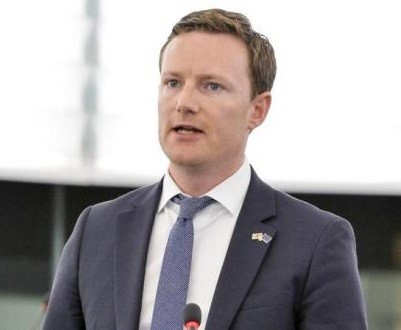With the changing political landscape, Bremain invited former contributors to our Bremainers Ask feature for their thoughts on the subject. Before the current coronavirus crisis, we asked them to comment on where we are now, how they see things moving forward and what we pro-Europeans should be focusing on in the future.
Last month, we brought you the thoughts of Harry Shindler, MBE, Kyle Taylor & Steve Bray. Here is the final instalment, & grateful thanks to all our contributors.
On paper, Boris Johnson may have “got Brexit done”: the UK is no longer a Member State of the European Union. But in practice, many of the real questions about future relations between the UK and the EU remain to be settled.
On the one hand, the UK Government under Boris Johnson has at least pulled free of the excruciating period when leading Leave campaigners, and then the administration of Theresa May, promised all things to all people and either believed or pretended that that could ever possibly happen in reality. The current UK position on future relations with the EU is at least possessed of greater internal coherence and demonstrates a higher level of political realism.
On the other hand, the cost of such clarity is that the UK Government is driving headlong towards a serious rupture in relations with the EU – a far cry from many of the Leave fantasies made back in 2016 and repeated consistently thereafter – and crucially, that will be true regardless of whether there is a deal or whether there is none. The British decision to rule out any transitional extension only exacerbates the situation by making “two regulatory changes” more likely in due course. And of course, there remains a shocking contradiction between Johnson’s propaganda about “Global Britain” as the champion of free trade versus the reality of a Government poised to commit the single gravest act of economic segregation in modern history.
Besides the damage which will inevitably flow from the UK’s decision deliberately to dislocate and distance itself from the Union, that choice also has various important internal consequences for the UK itself: for example, the customs tensions affecting Northern Ireland will only grow in proportion to the degree of Great Britain’s divergence from Union law; and the same is true as regards the management of internal trade between England, Scotland and Wales. But most of all: why is the Johnson Government so obsessed with the power to diverge from Union regulatory standards, many of which are only minimum in nature and do not prevent the UK from pursuing higher levels of protection? Perhaps “taking back control” is just an exercise in nationalist political rhetoric. But it seems more likely that the Tories do indeed harbour a dream of dismantling the UK’s adherence to Europe’s distinctive socio-economic model.
Moreover, the UK’s increasingly abrasive approach to the future relationship also poses serious challenges for the EU itself. Above all: the risk of an aggressive competitor on its very doorstep, actively undertaking market deregulation and encouraging social dumping as an alternative economic model; as well as constantly engaging in attempts to undermine the political unity and solidarity of the Member States – with the UK’s post-withdrawal but still essentially Leave-driven leadership potentially motivated by the belief that the relative success of their precious Brexit can best or indeed only be demonstrated by the relative failure of the equally hated EU. Even looking beyond the current generation of Tory politicians in office: the further and harder the UK does drift away from the European fold, the more difficult life will eventually be, even for a new administration more sympathetic to close relations with or indeed renewed membership of the Union.
For readers of this newsletter, it is also bitterly disappointing to see that the question of onward movement rights across the EU27 even for those UK nationals protected under the Withdrawal Agreement are not explicitly on the negotiating agenda – despite the two parties having repeatedly claimed that the issue would indeed be addressed in their “future partnership” talks. It may take some noisy lobbying to make sure the issue doesn’t just drop off the agenda (again).
So here we are. And we thought Brexit was bad enough. In fact, it was so bad that, having had quite enough of the dramatic highs and lows of the past three years my husband and I booked a trip as soon as I left the European Parliament to get away from it all. It was great! We had a fantastic time at the beach, the pool and an overland trip down the Malay Peninsula. I briefly forgot about the pain of losing the fight against Brexit and the sheer stress of it all. I remember joking one evening that whatever came next couldn’t be as bad as all that!
Fast-forward a few weeks and I am writing this on the eve of what is a likely announcement from the Prime Minister that we will have to stay indoors for the foreseeable future, an order that I know has already been in place in Spain for some time. We are afraid to go out, we give every passer-by a very wide berth. On the few occasions we do venture out we put on disposable latex gloves and a facemask – as much to protect anyone we come into contact with as ourselves.
We are living through something that is not just extraordinary, but which has profound consequences for our future. It is a global crisis, which will be far worse than 2008 in its impact. We must not let the UK government off the hook by letting them absorb the impact of Brexit into that of COVID-19, hoping no-one will notice. It would be reckless in the extreme to strangle a nascent recovery by pursuing an ideological agenda at a time when we need consensus and clear thinking to prepare us for the future.
Right now, we need to look after ourselves and our loved ones. We will get through this. And when we do, we must never give up on our fight: to create a world where we don’t divide each other on the basis of nationality but one where we are free to live our lives where we want, the way we want.
Many thanks to all of our Bremainers Ask contributors who have taken part in our Revisited series. Bremainers Ask will be back next month with Ian Dunt, Editor of Politics.co.uk and host of Remainiacs.








